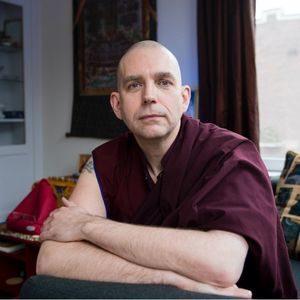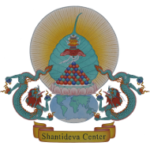In-Depth Meditation Training
with Venerable Losang Gendun
New Dates for Year 3 Term 1:
Saturdays, Sep 6, *13, *20, **27, *Oct 4, 11, 18, 25, Nov 1, 8, 15, 22 & 29, 9:30am–12pm EDT/EST
ONLINE
*IN-PERSON & ONLINE at Shantideva Center
**IN-PERSON & ONLINE at Tibet House US
Note: Registration will be available by August. Sep 27 will be part of a WEEKEND RETREAT. More information will be provided soon.
(click ⊕ to expand, ⊖ to collapse)
Year 3 Term 1: Sep 6 to Nov 29, 2025
The Radiant Ground: Emptiness and Buddha Nature
This year’s journey will weave together the profound view of Madhyamaka, as presented by Nāgārjuna and his successors, with the compassionate vision of Tathāgatagarbha, the Buddha-nature teachings that reveal our deepest potential for awakening. Far from abstract philosophy, these teachings offer a radical reorientation of how we perceive ourselves and the world — pointing us beyond habitual grasping to a space of clarity, openness, and profound compassion. Having cultivated the foundational practices of shamatha and vipashyana in the first year and explored Yogācāra’s profound psychology of ignorance and awakening in the second, we now turn to the very heart of Tibetan Buddhism: the nature of emptiness and the luminous potential that resides within every living being. Guiding us in this exploration will be core texts from India and Tibet. Nāgārjuna’s Mūlamadhyamakakārikā will serve as a central pillar, systematically dismantling the illusions of inherent existence. In dialogue with this, we’ll study Kamalashīla’s Stages of Meditation, a practical and accessible map for cultivating deep meditative insight grounded in the view of emptiness. Balancing the radical freedom of Madhyamaka, we will encounter the warmth and encouragement of Maitreya’s Ratnagotravibhāga, a poetic illumination of the Buddha-nature within all beings. These teachings remind us that beyond confusion and conditioning, there is a basic goodness that has never been lost. To ground these profound insights in daily life, we will also study the beloved text of Geshe Chekawa Yeshe Dorje, The Seven Points of Mind Training. With its pithy slogans and deeply practical tone, it offers tools for transforming adversity and cultivating bodhicitta on and off the cushion. Throughout the year, our study and practice will be enriched by meditative teachings from both the Pāli and Sanskrit sūtra traditions, inviting a direct and experiential understanding of emptiness — not as a concept, but as a liberating shift in perception. This year is an invitation to let the view of emptiness infuse your practice — not as abstract philosophy, but as living experience: clear, liberating, and rooted in compassion. Our aim is not to gather concepts, but to transform how we see and relate to the world. Through study, reflection, and meditation, we learn to meet life with less grasping, more openness — and a heart that naturally responds with wisdom and care, held by the strength of community.
Year 2 Term 2 & 3: Feb 1 to Jun 28, 2025
From February onwards, we’ll focus mainly on exploring the 37 Aids to Enlightenment and some of the Jataka Tales, the impressive stories of the Buddha’s past lives. These are inspiring, extraordinary stories that give us a personal view on and understanding of the bodhisattva and the various ways of interconnecting with his companions on the Path throughout lifetimes, thus storytelling our way towards Awakening.
Reading Materials
Regarding the reading materials, Ven. Gendun suggested reading ahead about the 37 Awakening Factors (or Harmonies with Enlightenment, from p. 26), as that will be one of the main topics in the upcoming term.
Year 2 Term 1: Sep 7 to Nov 30, 2024
In a world that often dismisses its significance, the mind remains mysteriously at the heart of what we call life. Founded by the brothers Vasubandhu and Asanga, the Buddhist Yogācāra school focusses on the mind as ‘forerunner of all things’, the creator of our experience, and the storyteller that narrates our existence. Yogācāra’s analysis of how the mind constructs our reality, can help us relieve the constraints of the ego, habitual patterns and reactive emotions, to experience greater ease, possibility, and freedom in every moment.
In the second year of the IDMT, we will emphasize the lived experience of meditation, both on and off the cushion. Guided by the Buddha’s third turning of the Wheel of Dharma, we will begin by training in the successive stages of shamatha, followed by a deeper journey into insight meditation.
We will also explore how concepts can blind and alienate us by adding an imaginary layer to our interdependent world. Using spiritual developmental models such as the 37 Factors of Awakening and the 10 Perfections, we will learn how to live more freely in daily life. We will also explore the role of narratives, the philosophy of language, and how to cultivate great compassion for all living beings to help heal our conflicted world.
Investigate:
1. Unlock the Mysteries of the Mind: Join IDMT’s second-year program and delve into the heart of Yogācāra teachings with expert guidance.
2. Explore the Heart of Yogācāra: Learn from the foundational teachings of Vasubandhu and Asanga, focusing on the mind as the creator of our experience.
3. Transform Your Understanding of Reality: Cultivate the 37 Factors of Awakening and the heart of a Buddha.
4. Embrace Interconnectedness: Join us in exploring the Buddhist Mind-Only school and cultivating great compassion for all living beings.
5. Narrate Your Path to Awakening: Explore the role of stories and language in shaping our experience and spiritual development.
6. Grow Spiritually: Cultivate the 10 Perfections as a journey towards enlightenment and making a difference in a troubled world.
7. Explore the Power of Meditation: Investigate the mind, the forerunner of all things, and transform your life through calm-abiding and insight meditation.
8. Integrate Meditation with Daily Life: Transform your practice on and off the cushion into a compassionate path of awakening.
9. See Beyond the Imaginary: Practice seeing deeply beyond conceptual blindness using insights from the Yogācāra school.
10. Discover the Inner Storyteller: Transform your narrative from self-criticism to self-trust through community, harmony through calmness, and empowerment through insight.
Year 1 Term 3: May 11 to Jul 6, 2024
Know yourself invited to join term three of the In-Depth Meditation Training (IDMT)! We will cover such topics as the Buddha’s enlightenment, how to meditate on The Four Noble Truths, why it is that we sometimes act against our own self-interest, how to deal with our mortality and the generation of such beautiful minds as equanimity, appreciative joy, benevolence, and care.
To complement the IDMT course we also offer:
- Meditation Retreats – week & weekend retreats on vipassana, compassion, and mahamudra, offered both at the centers and online.
- Yogi Bootcamp – an intensive, guided 1-year meditation training with weekly personal interviews (call) for a small group of international students.
- Practice days guided by Ven. Gendun and experienced students of Ven. Gendun
For more information about the content of the course, download the course description (PDF) here.
This course is a collaboration between 5 FPMT Buddhist centers: Shantideva Center New York (US), Jamyang Buddhist Centre Leeds (UK), Institut Vajrayogini in Marzens (FR), Yeshin Norbu Stockholm (SW) and Maitreya Instituut (NL) and therefore the course will be attended by an international group of Buddhist practitioners.
Year 1 Term 2: January 27 to April 27, 2024
The main topic of our first year’s second term will be the famous Mahasatipatthana Sutta. Defined by the Buddha as the direct path to liberation, it not only forms the basis for traditional and modern variants of insight meditation, but also practices ranging from Mahamudra and Dzogchen to Ch’an/Zen. Even after his Awakening the Buddha often practiced this form of insight meditation as an expression of his newfound state and to encourage us, the ones who follow in his footsteps.
On the basis of our practice of shamatha we will now explore of the characteristics of samsara – impermanent, selfless and unsatisfactory – and its cause ignorance, to see how this our understanding points towards ultimate freedom.
In the sutra the Buddha shows how to apply the principles of the Dharma to our embodied, affective and cognitive experience, indicating a new way of life that, empty of center, is boundless and of permanent empowered freedom and wellbeing. Building on the breath we will further explore meditation on the four elements, feelings, mind, the four noble truths and many other topics.
Year 1 Term 1: 2023
Began in the fall of 2023, the In-Depth Meditation Training (IDMT) is a new and comprehensive course whose goal is to provide meditators long-term support and guidance with their meditative practice.
This course examines traditional Buddhist methods of practice presented in ways appropriate for the modern Western mind. While grounded in the theory and practice of the Tibetan Buddhist tradition, the training aims to be responsive to the needs and levels of practice of the students.
This course is a response to Lama Zopa Rinpoche’s insistence that true fruition of our precious human life is the generation of bodhicitta, recognizing that a practitioner will need a good meditative practice to be able to accomplish this.
The training will run over the course of four years. Each year is divided into several terms. You can register for the whole term or individual sessions. New students starting in term 2 will have access to preparation materials prior to the first session.
- A discussion group for sharing thoughts, questions and challenges with the other students. TBA, 7-8pm EST/EDT, hosted by Shantideva Center.
- A weekly reflection group on Mondays, *1:30-2:30pm EST/EDT (7:30-8:30pm CET), hosted by Maitreya Institute Amsterdam (MIA). *2:30-3:30pm EDT on Mar 10-24 due to daylight savings
Please refer to registration confirmation email for Zoom links, or contact registration@shantidevanyc.org if necessary.
In-Depth Insight Training (IDMT)
Although grounded in the theory and practice of the Tibetan Buddhist tradition, with a drop of Theravada, the training will prioritize the needs and levels of practice of participants.
To get the most out of this course, we recommend you join in all sessions, or watch the videos on the website. However, it is possible to join on a drop-in basis (at least for the inaugural semester, starting September 2023).
Extensive content: you will receive weekly guided meditations combined with in-depth lectures that will cover a wide range of topics over the course of four years:
- Foundational Vipassana (insight meditation)
- Yogacara (Mind-Only School)
- Madhyamaka (Middle Way – Consequence School)
- Tathagatagarbha (exploring our buddha nature)
- Mahamudra (investigating the ultimate nature of the mind)
- Kriya Tantra (transforming everyday experiences into opportunities for spiritual growth and realization).
To put these ancient techniques in a contemporary context, the course will give special attention to the psychology of meditation, through topics such as spiritual bypassing (using spirituality to hide from our problems), identity, narrative (the role of stories in our mental makeup and practice), language philosophy and ritual.
The course offers a combination of:
- Practical focus: emphasizing direct, personal experience through meditation while involving all three traditional practices of hearing, contemplating and meditating. It aims to help you navigate your meditative journey successfully, both on and off your cushion. It will help you make progress amid your daily, often hectic life. Diverse topics necessary for your level of practice, and that of your fellow practitioners, are illustrated and explored in guided meditations.
- Training concentration and insight: you will train in both shamatha (concentration) and vipassana (insight). Together we will gradually explore and investigate both the nature of self and phenomena as being impermanent and selfless, empty of imaginary nature and of inherent existence, our buddha nature, and the union of bliss and emptiness respectively.
- Open heart and mind: while various forms of insight meditation will take center stage, the goal is to provide contemplations that will open your heart, through such topics as compassion, the precious human life, definite emergence, bodhicitta and devotion. These are often, but not exclusively, taken from the sutras and Lamrim texts on the gradual path to enlightenment.
- Engagement: to avoid that your practice becomes disconnected from the real-world issues you experience, attention will be given to how the Dharma can inform us on how to engage with our everyday challenges, avoiding dogmatism, political bias, or polarization, and be of benefit to the world that we are all a part of.
- Supporting materials: you will be provided with a reader that focuses on instructions from the Buddha and other foundational texts. This will be complemented with numerous essays and practical advice on a range of topics such as the arhat and bodhisattva ideals, the role of ritual, identity formation, metaphor in Yogacara, Buddhist epistemology, theory of narrative and so on.
How to participate:
- The course consists of weekly online sessions of a 60-minute guided meditation, a 90-minute lecture with ample opportunity for Q&A. Sign up for a whole semester or drop-in on a class by registering below.
- After registration, you will receive access to the Online Learning Center on The Buddha Project website. Here you will find access to the Zoom sessions, the supporting materials, and recordings of past guided meditations and lectures.
- Depending on the interest of participants, these classes may be embedded in practice days, guided by experienced students, which will provide a supportive environment for joint practice and discussion.
Who might want to participate:
- This course is beneficial for practitioners who want to further develop their meditative practice, by receiving in-depth meditation instructions and by getting a deeper understanding of the (philosophical and psychological) foundations of meditation. It will provide a complement for those who study Buddhism, to investigate and verify experientially the various subjects taught by the Buddha.
- To participate you will need a basic understanding of Mahayana Buddhism, although the course will introduce many of the foundational topics. A basic understanding can mean having completed FPMT’s Discovering Buddhism course or the FPMT Basic Program or having obtained a similar level through other means.
Short Video: Focus of In-Depth Meditation Training
Ven. Losang Gendun of IDMT discusses the power of shamatha (calming/enhance the mind) and vipassana (seeing directly) in helping to liberate us from suffering. He also talks about the benefits, limitations, and roles of Buddhist scriptural tradition and reasoning on the path to enlightenment.
Short Video: What is Meditation – Really?
Ven. Losang Gendun of IDMT shares how meditation on and off the cushion create a beautiful cycle that helps us learn how to see the world anew, with curiosity and delight.
Recording of Q&A Session
Ven. Losang Gendun introduces the IDMT course and answers people’s questions.
Important Note
This is an online-only event that is administered using Zoom.
After registering, the system automatically sends a confirmation and/or a receipt email that contains the Zoom meeting link and/or other instructions. If you don’t immediately receive the system email(s) or you have any other questions, please contact us at registration@shantidevanyc.org.
*Zoom is an interactive video-conferencing tool that allows participants to see one another and ask questions. You will need a computer, a tablet or a smartphone with the Zoom application to attend. If you are using Zoom for the first time, please login earlier to allow any necessary installations on your device.
Registration / Schedule
Suggested: $16 per session
Since IDMT is hosted in partnership with other FPMT centers, it is not included under Mandala membership.
Finances should never be a barrier to the Dharma. If the suggested donation (which is based on 15 Euros/session) is too high, any amount will be greatly appreciated. The suggested amount supports general center expenses such as rent, taxes, utilities, website maintenance and other logistical needs. Your support enables us to continue sharing the wisdom of the Dharma with our global community.
This registration is for year 3 Term 1, from Sep 6 to Nov 29. You can register for all sessions at once or over time by selecting the relevant dates. To set up a payment plan, email registration@shantidevanyc.org
Schedule: 60 minutes of meditation and 90 minutes for lecture and Q&A.
The sessions are recorded by The Buddha Project. By registering for this event, you are agreeing to give your consent to this process. To protect your privacy, we recommend being conscious about any personal information you share during the sessions. To further enhance anonymity, you may want to consider turning off video or naming yourself using abbreviations.
Time zone: US Eastern Daylight Time (GMT/UTC-4)
For questions regarding registration, please email registration@shantidevanyc.org for assistance.
Additional Materials
Recordings and course materials are accessible for students at The Buddha Project, which requires of a separate login. Please email registration@shantidevanyc.org for assistance.
Dana for the Teacher
About the Teacher

Venerable Losang Gendun has dedicated nearly four decades to practicing Buddhism and has served as a Bhikshu (Buddhist monk) in the Tibetan tradition for the past 18 years. Prior to his ordination, he worked in diverse fields such as palliative care, technology, refugee organizations, and commercial management. His extensive training includes ten years of studying Buddhist philosophy and practice in monasteries across France, India, Nepal, and Myanmar. Additionally, he spent over four years in retreat, immersing himself in Tibetan sutra and tantra, as well as the Burmese Theravada Forest Tradition.
For the last 15 years, Ven. Gendun has been a dedicated teacher, sharing his knowledge of Buddhist philosophy, psychology, and meditation worldwide. He serves the aspirations of H.H. the Dalai Lama and Lama Zopa Rinpoche as part of the FPMT (Foundation for the Preservation of the Mahayana Tradition). Ven. Gendun is also a member of Mind & Life Europe, a multidisciplinary laboratory that brings together researchers and contemplative practitioners to explore the nature of experience.
Beyond his Buddhist affiliations, Ven. Gendun serves as an interreligious canon at the Peace Cathedral in Tbilisi, Georgia, and feels at home at a Mevlavi Sufi dargah in Istanbul. In 2023, he founded The Buddha Project, which engages in long-term guidance for Buddhist meditators, scientific research, art projects, and intercontemplative social engagement.


